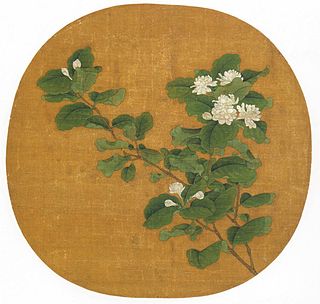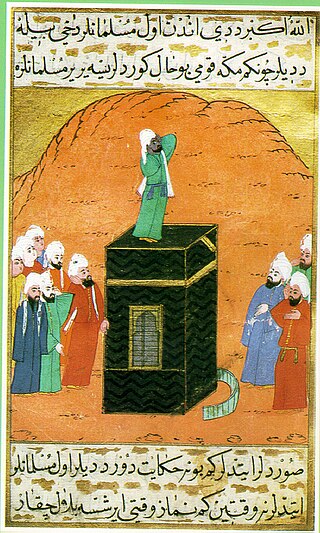Fatima, also spelled Fatimah, is a feminine given name of Arabic origin used throughout the Muslim world. Several relatives of the Islamic prophet Muhammad had the name, including his daughter Fatima as the most famous one. The literal meaning of the name is one who weans an infant or one who abstains.

Ali is a common unisex name.
Nadia is a female name. Variations include Nadja, Nadya, Nadine, Nadiya, and Nadiia. Most variations of the name are derived from Arabic, Slavic languages, or both.
Mustafa is one of the names of the Islamic prophet Muhammad, and the name means "chosen, selected, appointed, preferred", used as an Arabic given name and surname. Mustafa is a common name in the Muslim world.
ʻAbd al-Ḥamīd, also spelled as Abdulhamid, Abd-ul Hamid, and Abd ol-Hamid, is a Muslim male given name, and in modern usage, surname. It is built from the Arabic words ʻabd and al-Ḥamīd, one of the names of God in the Qur'an, which gave rise to the Muslim theophoric names. It means "servant of the All-laudable".
Nassim also transliterated as Nacim, Naseem, Nasseem, Nasim, Nesim or Nessim, is a unisex name meaning "gentle breeze, fresh air". It is mostly used in Middle Eastern and South Asian cultures and language groups. It may refer to:
Khan is a surname of Turko-Mongol origin, today most commonly found in parts of India, Pakistan, Afghanistan, Bangladesh, Uzbekistan and Iran. It is derived from the historic title khan, referring to military chief or royalty. It originated as a hereditary title among nomadic tribes in the Central and Eastern Eurasian Steppe during antiquity and was popularized by Afghan dynasties in the rest of Asia as well as in Eastern Europe during the medieval period.
Hamid refers to two different but related Arabic given names, both of which come from the Arabic triconsonantal root of Ḥ-M-D (ح-م-د):
- Ḥāmed also spelled Haamed, Hamid or Hamed, and in Turkish Hamit; it means "lauder" or "one who praises".
- Ḥamīd also spelled Hamid, or Hameed, in Turkish is Hamit, and in Azeri is Həmid or Һәмид; it means "lauded" or "praiseworthy".
Yusuf is a male name meaning "God increases". It is the Arabic equivalent of the Hebrew name Yosef and the English name Joseph. It is widely used in many parts of the world by Arabs of all Abrahamic religions, including Middle Eastern Jews, Arab Christians, and Muslims.
Tariq is an Arabic word and given name.
Masoud is a given name and surname, with origins in Persian and Arabic. The name is found in the Arab world, Iran, Turkey, Tajikistan, Afghanistan, Uzbekistan, Pakistan, Russia, Bangladesh, Malaysia, and China. Masoud has spelling variations possibly due to transliteration, including Masud, Massoud, Massoude, Massudeh, Masood, Masʽud, Mashud, Messaoud, Mesut, Mesud, Massood, or Mosād.
Jamila (Arabic: جميلة) is a feminine given name of Arabic origin. It is the feminine form of the masculine Arabic given name Jamil, which comes from the Arabic word jamāl, meaning beautiful. The name is popular on a global scale, in regular use by both Arabic speaking and non–Arabic speaking populations and holds religious significance for some Muslims. Due to differences in transcription, there are several variations on how to spell the name.

Jasmine is an English feminine given name.
Zahra is a female given name of Arabic origin. It means ‘beautiful, bright, shining and brilliant’. The name became popularized as a result of being the name of Muhammad’s daughter, Fatimah al-Zahra.
Yasmin, Yasmine, or Yasmina may refer to:
Malik, Maleek, Malek or Malyk is a given name of Semitic origin. It is both used as first name and surname originally mainly in Western Asia by Semitic speaking Christians, Muslims and Jews of varying ethnicities, before spreading to countries in the Caucasus, South Asia, Central Asia, North Africa and Southeast Asia where most users are Muslim.
Farida is an Arabic feminine given name, meaning unique/ precious pearl. In Urdu it is spelled and pronounced the same way as Arabic. In Turkish it is spelled as Feride. In Persian, the name is rendered as Farideh in the Iranian dialect, but Farida (Фарида) in the Afghan and Tajik dialects. It is one of the common female names throughout the Muslim world.

Bilal, or variants, is both a given name and a surname of Arabic/African origin. Notable people with the name include:
Jasmina, sometimes Jasminka, as a feminine variant, and Jasmin, sometimes Jasminko, as a masculine variant, are given names used in Bosnia and Herzegovina, Croatia, Macedonia, Montenegro, Serbia, Bulgaria and Slovenia, and same as a given name Jasmine, which is the common form in German, Romance and English-speaking countries, although almost always as a feminine variation.
Salim is a name of Arabic origin meaning "safe" or "undamaged". Related names are Selima, Salima, Saleemah, and Salma.



